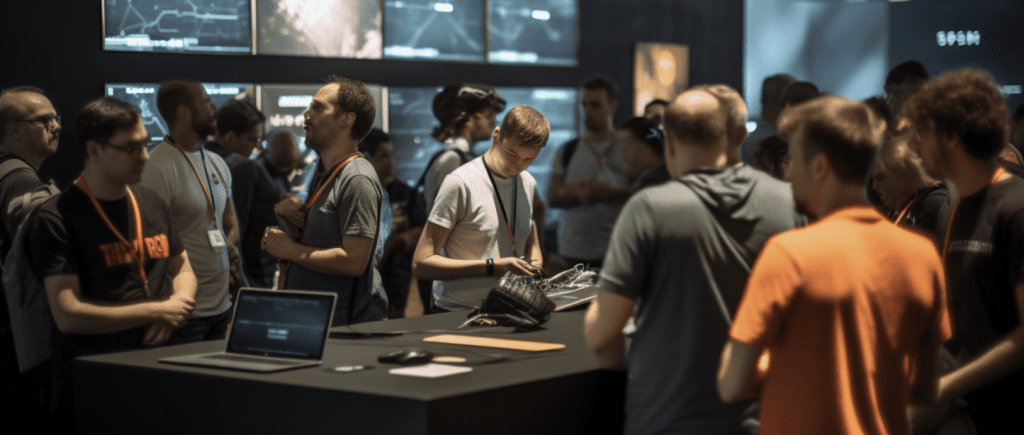With the growing popularity of digital assets and decentralized finance, blockchain jobs are becoming increasingly lucrative and desirable. If you’re looking for a career with the potential for innovation, challenge, and outstanding opportunity, this list will guide you though the different jobs in the blockchain sector and what to expect.
- Executive Blockchain Roles
- Blockchain Developer Roles
- Sales & Marketing Roles
- Blockchain Finance Roles
- Misc Blockchain Roles
Executive Blockchain Jobs
The founders and their first hires generally fill the c-suite executive roles available for any given project but occasionally there is an opening for someone to come in.

Founder/CEO
The founder(s) and CEO of a blockchain project are generally the ones that do the most work and take the most risks based on the projects success. A blockchain sector CEO is responsible for:
- Developing the company’s vision, mission, and strategy
- Raising capital and securing funding for the company’s growth
- Assembling a talented team and overseeing the initial hiring
- Establishing partnerships and collaborations with other projects
- Staying up to date on emerging blockchain technologies and trends
- Building relationships with investors, stakeholders & users
- Developing marketing and outreach campaigns to raise awareness
- Overseeing the technical development of blockchain-based solutions
- Creating literature such as whitepapers, pitch decks and websites
- Navigating the regulatory landscape of the blockchain industry
Average salary: $25,000-$1,000,000
This is one of the hardest roles to pin down a salary. If you are raising angel funding then you can’t justify taking a large salary whereas for developed projects that are successful the sky is the limit.
C-suite executives will also often receive compensation in the form of salary and native governance tokens which may or may not be liquid. It’s important for the project that the people in charge have skin in the game.
CTO/Lead Developer
The role of a Chief Technology Officer (CTO) is to oversee the company’s technical development and ensure the products are aligned with the company’s goals and vision. Here are some specific responsibilities and tasks that a CTO in a blockchain project may take on:
- Developing and implementing the company’s roadmap
- Managing and supervising the developer team
- Leading the technical design and architecture
- Researching and staying up to date with the latest tech advancements
- Evaluating and selecting the appropriate partners and infrastructure
- Ensuring the product scales to the necessary requirements and putting out fires when it doesn’t
- Ensuring the security and privacy of any data
- Building and maintaining relationships with vendors and partners
Average salary: $150,000-$300,000
Again salaries vary and new startups wont have the budget to compete with established protocols. To get anyone good, with experience in production level smart contracts and the social skills to manage a team, compensation needs to be in excess of $200k.
COO/Operations Manager
The role of a Chief Operating Officer (COO) is to oversee the day-to-day operations of the company and ensure that the organization is running efficiently and effectively. Here are some specific responsibilities and tasks that a COO in a blockchain project may take on:
- Doing all the jobs that the CEO doesn’t have bandwidth for
- Developing and implementing operational procedures & systems
- Supervising the activities of different departments
- Ensuring the projects goals & KPIs are being met within budget
- Developing company strategy with the rest of the c-suite
- Building and maintaining relationships with partners and stakeholders
- Identifying and mitigating operational and regulatory risks
Average salary $80,000-$200,000
In the blockchain sector, governance tokens, equity compensation and performance-based bonuses are common, which can significantly increase the COO’s total compensation package.
CFO/Finance Manager
The role of a Chief Financial Officer (CFO) is to manage the project’s financial operations and ensure that it has the necessary resources to achieve its goals and objectives. Here are some specific responsibilities and tasks that a CFO in a blockchain project may take on:
- Developing and managing the company’s financial strategy and budgets
- Overseeing the company’s financial reporting and analysis
- Ensuring compliance with accounting standards and regulatory requirements
- Managing the company’s cash flow and payroll
- Raising capital and developing potential investor relationships
- Creating financial projections, tokenomics plans and forecasts
Average salary $80,000-$200,000
Blockchain Developer Jobs
Developers build the products and services that make or break a project. Here are some of the more common blockchain based roles available.

Smart Contract Developer
Developing smart contracts is a tough job because it doesn’t follow normal principles of something like web development where you can progressively make improvements and fix bugs on the fly.
When creating permissionless, immutable smart contracts (the best kind) you can’t make code changes after the contract has been deployed. For this reason the debugging and testing stages tend to take more time than the creative coding stage.
Salaries for smart contract developers vary based on experience and geo-location. During bull markets there is a shortage of Solidity developers and it creates a competitive environment for employers.
Average salary $60,000-$250,000
Web3 Frontend Developer
The frontend developer for a project is very similar for web3 as it is for web2 with the addition of a library like ethers.js to connect to the digital wallet and execute on-chain functions.
There are often occurrences where you need to access aggregated data using something like Moralis or a in-house solution as well. Projects tend to use familiar frameworks such as React, Vue, Angular & NextJS.
If you have web dev experience then you’ll likely be able to transition into web3 frontend work with relative ease. Because of this salaries don’t tend to be as high except for the top developers who have previous experience at top tier protocols.
Average salary $40,000-$150,000
Junior Developer
It’s hard to find roles for junior developers who might not have the experience to roll out smart contract code directly without oversight from a more experienced dev. These roles do exist however and it’s possible to contact teams to see where you can fit in. If you are interested in a jnr dev role you can offer to create unit tests, create documentation and natspec the code bases as well as create testnet prototypes where there is more room for learning on the job.
Average salary $20,000-$80,000
Security Auditor
In my opinion a security auditor is the toughest job in the blockchain sector. Blockchains are transparent and publicly accessible, which can make it easier for attackers to identify vulnerabilities and exploit them. Security auditors need to be one step ahead of the blackhats to anticipate potential attack vectors and ensure that the blockchain system is secure.
DeFi protocols often contain valuable assets in the smart contracts which means a security breach could have significant financial consequences. Security auditors need to be extremely diligent, talented and thorough in their work.
There are two paths for security auditors:
- Independent auditor finding vulnerabilities for projects offering bug bounties on programmes like ImmuneFi and Code4rena
- Join a existing team that is contracted to audit clients code
Average salary $100,000-$500,000
Salaries vary based on the competence of the auditor. If you can find critical cutting edge vulnerabilities then there are no limits to earning potential. Some critical level bug bounties have seven figure pay-outs for a single vulnerability.
Infrastructure Developer
There are a lot of nuts and bolts development jobs such as maintaining nodes, working on architecture and creating the infrastructure that works behind the scenes.
These jobs vary greatly depending on the project and what is involved. Many alternate layer 1 blockchains are based on Geth so experience with Golang is valuable here. Likewise there are plenty of Rust based roles at various blockchain projects.
These roles tend to be more general and salaries are reflective of standard tech startup rates.
Average salary $50,000-$250,000
Sales & Marketing Jobs
Like all startups, crypto projects are reliant on growth and finding users. For this reason a talented team of sales and marketing personnel are essential to the success of the project.

Digital Marketer
Digital marketers leverage online marketing tactics such as search engine optimization (SEO), search engine marketing (SEM), social media marketing, email marketing, and content marketing to achieve their goals.
Here are some specific tasks that a digital marketer might be responsible for:
- Creating & managing digital marketing campaigns
- Designing creative content and banner ads
- Managing social media accounts
- Looking for ways to drive traffic and attention to the project
- Creating and sending email campaigns, newsletters and autoresponders
- Analysing and optimising existing campaigns to continuously improve performance in line with KPIs.
Average salary $20,000-$70,000
Community Manager/Moderator
A community manager spends a lot of time on Discord and Twitter engaging and building the community of followers and stakeholders.
Good community managers will run effective content programs to constantly keep the project news flow up to date. CM’s are responsible for:
- Responding to queries
- Executing social media marketing plans
- Managing daily content like AMA’s & Twitter spaces
- Building a targeted audience for the project
- Keeping the channels clean of spam
Average salary $10,000-$30,000
These roles are often outsourced and require no previous experience most of the time. Often active people in the community will be picked and offered roles as moderators.
UX/CRO Designer
These are two separate roles really but they often get bundled in to the same category or a project will choose to go down one path or the other. While both UX (User Experience) and CRO (Conversion Rate Optimization) job roles are focused on improving the user experience and UI performance, they differ in their specific goals and approaches.
The primary goal of a UX designer is to improve the overall user experience of a dApp or product. This includes creating a seamless user journey, intuitive navigation, and designing visually appealing interfaces. On the other hand, the goal of a CRO specialist is to optimize the website for maximum conversions by improving the user flow, identifying and removing barriers to conversion, and A/B testing various design elements to improve conversion rates.
UX designers often take a more holistic approach to improving the user experience by designing user-centric solutions that are both functional and visually appealing. They may conduct user research, create user personas, and conduct usability testing to ensure the design meets user needs. CRO specialists, on the other hand, focus on data-driven optimization strategies. They may use tools such as A/B & multivariate testing to identify areas for improvement and test various design changes to improve conversion rates.
UX designers typically have skills in user research, wireframing, prototyping, and graphic design. They may also have knowledge of front-end development and coding. CRO specialists, on the other hand, typically have skills in data analysis, A/B testing, and web analytics tools. They will also often have knowledge of coding to implement design changes.
Average salary $80,000-$200,000
Events Organiser
Events organisers travel the world, going to parties and living the dream… in theory. In practice there is a lot of planning and logistics that goes into setting up booths at global events, normally at short notice.
Events organisers will plan and budget for events that the project want to be involved in. This can be anything from 1 to 20 conferences a year for bigger projects. They then will often be responsible for negotiating terms with the organiser and getting quotes for booth setup, swag and anything else.
Crypto conferences are famous for having the worlds weirdest parties and it will be the events organiser that will also have to coordinate with the team if they are going to host an after hours event.
Average salary $40,000-$150,000
There are a lot of other perks such as travel and expenses for this type of role. It’s well suited to young professionals with good communications skills and no ties.
Customer Support
For a lot of projects customer support is simply handled by the community managers who point users to the docs. For centralized exchanges and entities it’s often a case that they need to offer their users individual support.
“good morning have you tried turning it off then on again?”
This is a role that is often outsourced and not prioritised in terms of finding quality talent.
Average salary $20,000-$40,000
Business Development
The role of a business development job is to help the project grow by identifying new business opportunities, developing relationships with potential partners and ultimately expanding the projects user base. Here are some common roles and responsibilities of a bizdev job in the blockchain sector:
- Identify new business opportunities that align with the company’s goals. This may involve outreach, networking and monitoring competitors
- Develop relationships with potential partners such as investors, vendors, and strategic partners
- Negotiate terms & agreements for partnerships
- Tracking metrics such as TVL, user onboarding and retention
- Setting up communication channels with key personell
On that last point the most successful bizdev’s I’ve seen often set up an individual Telegram group for every project partnership they are working on. Developers get added to the group to work on integrations etc.
Average salary $40,000-$80,000
Salaries vary based on the projects size and how much business and revenue they are generating from the new leads being brought in. Someone extroverted with a likable outgoing personality is ideal for this role, these type of people are rare in the blockchain sector.
Blockchain Finance Jobs
There are plenty of financial roles within the blockchain sector which range from investment and trading to accounting.

VC/Fund Analyst
An analyst in the blockchain sector is responsible for evaluating potential investment opportunities and crypto projects. Their primary role is to analyse, assess and report on the potential of different digital assets.
They may conduct in-depth research on the industry, trends, and emerging technologies in the blockchain space. They will also work closely with an investment team to evaluate the viability of potential investments and provide recommendations based on their findings.
A fund analyst may also assist in the due diligence process, which involves conducting a thorough investigation of a potential investment target to ensure that it aligns with the fund’s investment criteria.
Average salary $30,000-$350,000
Salaries vary as it’s a wide ranging role from junior analyst to senior partner.
Quantitative Analyst/Developer
Quants are responsible for developing and implementing mathematical models and algorithms to support trading strategies and improve algorithmic trading performance.
Quants will analyse market data to identify areas of alpha that can be exploited for a profit. They will then backtest a strategy and build trading bots to capture that opportunity. They may also be responsible for maintaining existing systems, in a constant battle for performance.
There are roles for quants at large market makers and crypto-native funds.
Average salary $80,000-$200,000
Many of the large financial firms in the sector run bonus programmes which can make up a significant amount of overall compensation.
Trading & OTC desks
Traders execute trades and manage trading positions in crypto markets. Their primary goal is to either allocate assets as efficiently as possible or to execute trades profitably getting in and out of positions in a short time period.
OTC desks quote large orders and then fill them on the backend or from an existing portfolio.
Traders responsibilities may include:
- Analysing market data and sentiment to set biases and develop trading strategies
- Executing limit orders on centralized exchanges
- Executing AMM trades in DeFi
- Communicating with clients, OTC desks and other traders to negotiate deals
- Monitoring market developments and news to stay informed of market trends
- Creating and complying with risk assessment measures
- Maintaining trading records and preparing reports on trading performance and profitability
Trading desks can be fast-paced and highly competitive, requiring strong analytical skills, quick decision making abilities and a comfort around risk. Traders may work long hours due to the 24/7 nature of crypto markets.
Average salary $60,000-$150,000
Most successful traders will eventually bridge out on their own to manage their own assets or start a prop trading firm.
Accountant
Accountants help blockchain projects manage their traditional finances with bank accounts and payroll while also complying with regulatory requirements.
The responsibilities will vary depending on the size of a startup but generally include:
- Maintaining accurate financial records, including managing accounts payable and receivable, tracking expenses, and reconciling bank statements
- Preparing financial statements, such as income statements, balance sheets, and cash flow statements
- Forecasting future financial performance based on projections
- Preparing and filing tax returns and managing tax audits
- Evaluate the financial implications of business decisions, such as investments, pricing strategies and expansion plans
- Prepare financial statements, decks and reports for potential investors and manage equity and debt financing
Average salary $40,000-$120,000
Misc Blockchain Jobs
Here I will try to cover all the other blockchain jobs that don’t fit in to the previous categories.

Consultant/Advisor
Consultants help crypto projects develop and implement strategies to improve their operations and achieve their goals. If you can imagine a new field or problem that you have as a business then there will likely be a consultant who specialises in that area.
- Business Planning
- Strategy Development
- Marketing
- Financial Analysis
- Legal Counsel
- Operations Management
- Human Resources
- Security Consultant/Auditors
- Solidity Developers
- Frontend/App Development
Average salary $100,000-$250,000
Consultants normally charge by the hour or via a monthly retainer.
Influencer / Content Creator
There are very few content creators in the blockchain sector that can make a full time living just from making content. The ones that do tend to run their operations like a large media company. A good example of this is Guy from Coinbureau or David and Ryan from Bankless.
Creating the content is just the start, if you want to make money from it, you have to manage sponsorships, promotions, events, courses, marketing. All of this while grinding out constant high quality content on a daily basis.
For me creating content is a hobby and I don’t do sponsored videos or shills but I do get asked almost weekly to create promotional content and participate in affiliate schemes. Prices vary but for a medium sized crypto focused channel you may be offered $2-5k per sponsored video.
YouTube and some other channels pay content creators a share of ad revenue but this isn’t very much. To give you some idea my channel with 17k subscribers currently earns $200-300 / month. The blog doesn’t make anything as there are no ads and I spend more than I make on filming equipment.
Compliance Officer
The role of a compliance officer is to ensure that their project complies with relevant laws, regulations, and internal policies. This will likely be securities regulations and KYC/AML requirements in the blockchain sector.
- Compliance officers develop and implement policies and procedures
- Conducting risk assessments and develop strategies to mitigate regulatory risks
- Providing training and guidance for the rest of the team
- Maintain records of the organization’s compliance activities
- Keeping up-to-date with new regulations that change frequently in this industry
Average salary $60,000-$150,000
Salaries are based on previous experience with the most desirable compliance officers having worked at a regulator in the past.
MEV Searcher
Searchers look for opportunities in decentralized finance where they can execute strategies that are often profitable within the same block.
Some examples of MEV include:
- Sandwich Attacks when a large trade goes through an AMM it moves price which allows a searcher to front run it by reordering the transactions in the block. The trade involves inserting a buy order for the same asset and then a sell order after the large trade has moved the price due to slippage.
- Liquidations occur when a borrower’s collateral falls below a certain threshold, triggering a liquidation opportunity of their assets. Protocols such as Aave have liquidation engines which pay searchers a fee to carry out the liquidation and sell off the assets efficiently.
- Arbitrage involves buying an asset on one platform and selling it on another for a profit. This might be across different decentralized exchanges or even across multiple blockchains. There is an example of a simple DEX arbitrage strategy here: https://jamesbachini.com/dex-arbitrage/
MEV searchers are independent so there is no set salary. Normally they make money in bull markets and/or when there are significant price swings and volatility. As asset prices get out of line it creates more liquidations and arbitrage opportunities.


